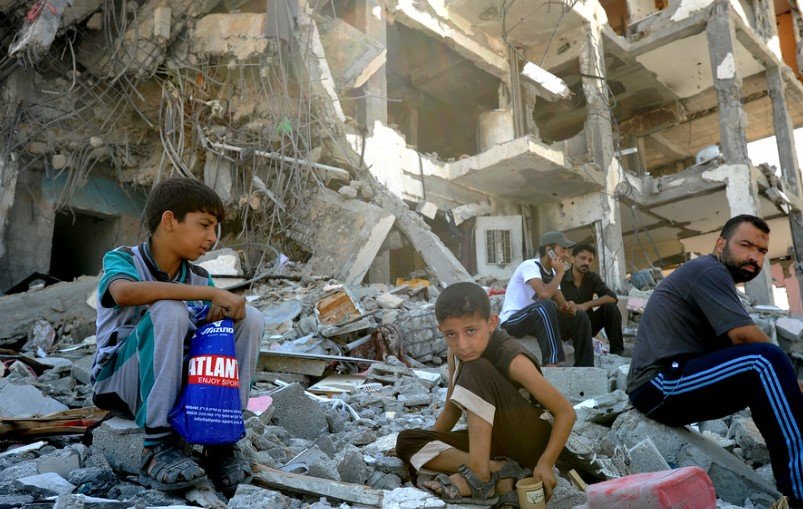An Israeli airstrike hit Nasser Hospital in southern Gaza on August 25, 2025, killing at least 20 people including five journalists and drawing global outrage. The attack, described as a double-tap strike by witnesses, came amid ongoing conflict, sparking protests that shut down highways in Tel Aviv as demonstrators demanded hostage releases and an end to the war.
Strike Details and Immediate Aftermath
The strike targeted Nasser Hospital in Khan Younis, a key medical facility in Gaza. Health officials reported that the first missile struck the building, and a second hit soon after as rescue teams arrived, increasing the death toll.
Eyewitnesses said the attack happened in the evening, with victims on the fourth floor including medical staff and reporters covering the conflict. The hospital, already strained by months of fighting, saw chaos as survivors pulled bodies from the rubble.
Palestinian authorities confirmed 20 deaths and many injuries, with the facility losing power and supplies in the blast. Rescue efforts continued into the night, hampered by ongoing military activity in the area.
This event adds to a pattern of hospital strikes in Gaza since the war began in October 2023, raising concerns about civilian safety in medical zones.

Journalists Among the Victims
The strike claimed the lives of several journalists, highlighting the dangers faced by media workers in the region. Five reporters died, including freelancers and staff from major outlets, who were at the hospital to document the humanitarian crisis.
- Hussam al-Masri, a cameraman for Reuters, known for his frontline coverage.
- Mohammed Salama, a photographer with Al Jazeera, who had reported on multiple Gaza stories.
- Mariam Dagga, a freelancer for the Associated Press, remembered for her powerful images of daily life under siege.
- Maryam Abu Daqqa, from Independent Arabia, who captured the human side of the conflict.
- Ahmad Abu Aziz, with Quds Feed Network, focused on youth perspectives in Gaza.
A rescue worker also perished, and others suffered critical injuries. Families and colleagues mourned the losses, sharing tributes online and calling for protection of press freedom.
These deaths bring the total number of journalists killed in Gaza since October 2023 to nearly 200, according to monitoring groups. Many see this as part of a broader effort to limit reporting on the ground.
Israeli Government Response
Israeli Prime Minister Benjamin Netanyahu called the strike a tragic mishap and expressed regret, stating that his government values journalists and medical staff. He announced an immediate military inquiry to review the incident.
The Israel Defense Forces released a statement saying they targeted what they believed was a militant site near the hospital, but admitted the possibility of error. Officials promised a full investigation and cooperation with international bodies.
This response came amid growing pressure from allies, including the United States, where President Donald Trump said he was not happy about the attack and predicted the war could end soon. Netanyahu’s office emphasized that such events are rare in their operations.
Critics argue that apologies alone do not address repeated strikes on civilian areas, urging stronger accountability measures.
International Reactions and Concerns
Global leaders condemned the attack, with the United Nations calling for an independent probe into strikes on hospitals and journalists. Human rights groups warned that continued violence could lead to war crime charges.
In the US, rights organizations highlighted potential legal risks for American personnel involved in supporting Israeli operations, such as providing intelligence. They noted that direct participation might make the US a party to the conflict under international law.
Media outlets worldwide expressed solidarity, with press freedom advocates demanding safe access for reporters in Gaza. The incident also fueled discussions on the role of double-tap strikes, which target rescuers and are seen as violations of war rules.
Trump’s comments suggested a push for a conclusive ending to the war within weeks, though details remain unclear. European nations echoed calls for ceasefires to protect civilians.
Protests Erupt in Tel Aviv
As news of the strike spread, thousands of Israelis took to the streets in Tel Aviv, blocking major highways to protest the government’s handling of the war. Demonstrators waved signs demanding the release of hostages held in Gaza and an immediate end to hostilities.
Police reported arrests as traffic ground to a halt on key routes, with chants echoing calls for Prime Minister Netanyahu’s resignation. Organizers said the protests reflected widespread frustration with the prolonged conflict.
This wave of unrest follows similar actions in recent months, where families of hostages have led efforts to pressure leaders. Protesters argue that military actions like the hospital strike harm Israel’s image and delay peace.
| Key Protest Details | Information |
|---|---|
| Location | Tel Aviv highways |
| Main Demands | Hostage release, end to war, government change |
| Participants | Thousands, including hostage families |
| Impact | Traffic shutdowns, multiple arrests |
| Duration | Ongoing into August 26, 2025 |
The demonstrations show deep divisions within Israel over the Gaza strategy, with some supporting military efforts and others seeking diplomatic solutions.
Broader Impact on Gaza Conflict
The hospital strike underscores the dire humanitarian situation in Gaza, where over 40,000 people have died since the war started, according to health ministry figures. Shortages of food, water, and medicine have worsened, with hospitals like Nasser operating at minimal capacity.
Journalist safety remains a critical issue, as media workers face risks from all sides while trying to report the truth. International bodies have documented patterns of targeted killings, prompting calls for protective measures.
Recent events, including strikes on other medical facilities, have led to accusations of systematic attacks on infrastructure. Aid groups urge all parties to respect international laws protecting civilians.
As the conflict enters its second year, efforts for ceasefires continue, but progress is slow amid political pressures.
What do you think about these events? Share your thoughts in the comments below and spread the word by sharing this article with others who care about global news.
